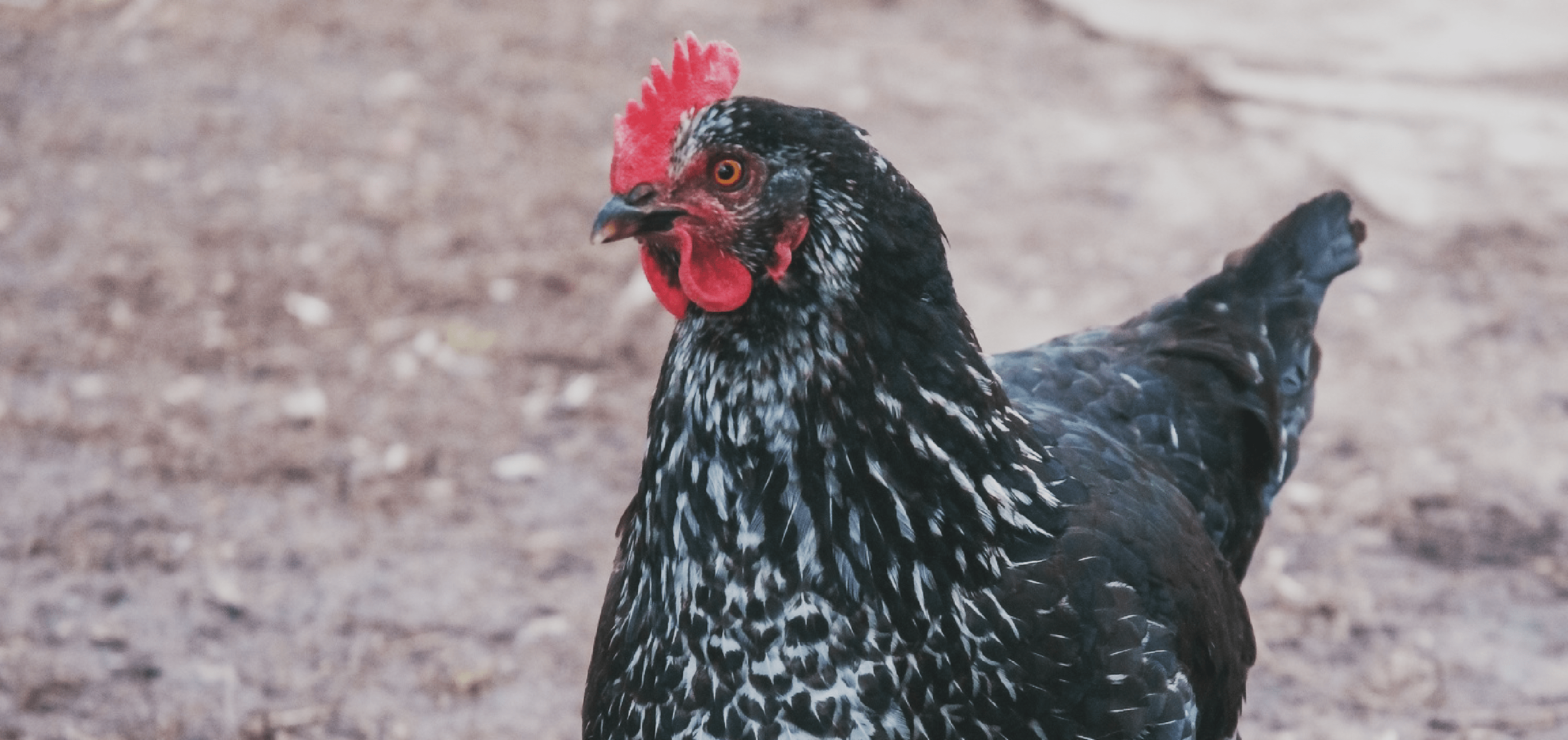Urban (or backyard) chicken-keeping is becoming increasingly popular across Canada. Many people are drawn to the romanticized idea that keeping hens will help them become more self-sufficient, and eat more local food.
That’s why some larger municipalities across the country are grappling with whether they should be endorsing or rejecting this practice. We get it—factory farms crowd egg-laying hens in tiny battery cages, mutilate their beaks and toes, and kill the birds after only a year or so when their bodies start to give out. But discussions about urban chickens often miss the very real risks to the birds, and to public safety. Here’s a list of the top eight reasons why chickens shouldn’t be kept in cities.
1. Exposure to Wildlife & Predators
Urban centres across Canada are home to a variety of wildlife including foxes, coyotes, raccoons, skunks, birds of prey, mice, and rats. They are also home to many domesticated cats and dogs. Many of these animals prey on chickens, particularly if they are not kept in predator-proof structures. The presence of chickens alone may not necessarily attract animals, but the sounds they make, their diet, and the waste they produce do. The presence of undesired animals in or around backyard coops can cause serious conflict. For example, predators attracted by chickens may also kill, injure or stress out companion animals like cats and dogs who are let outside. Human/wildlife conflict may also occur while attempting to shoo predators away, possibly leading to an avoidable injury to the human or the wild animal. This has been a notable point of concern raised by individuals in Canadian municipalities considering the allowance or expansion of backyard chicken-keeping.
2. Abandonment or Killing of Chickens
Unwanted chickens are regularly abandoned by careless or overwhelmed owners. While people may be well intentioned when they decide to set up a backyard chicken coop, they often find themselves unwilling or unable to care for these animals, who can live to be more than 10 years old but whose egg laying capacity declines relatively early on in life. Other challenges, such as the cost of food, the cost of building and maintaining adequate coops, the lack of available or affordable veterinary care, restrictive space requirements, the inability to provide the labour required, noise, mess, or attracting unwanted pests all may prompt an owner to decide to part ways with their flock in short order. This has led to hens being abandoned, or, worse—being slaughtered without oversight (despite rules against this).
Caring for chickens for the duration of their lives requires significant knowledge and expertise relating to their general care, hygiene, feeding, socialization, and housing. Some people may have this expertise or a willingness to learn, but others who do not may eventually abandon their hens.
3. Further Overburdening Shelters and Rescue Groups
When chickens are surrendered, abandoned, or seized by authorities, it falls to animal rescue groups and sanctuaries to care for them. This added burden comes with significant costs for these organizations, which are typically volunteer-run charities and nonprofits that receive no government funding. Rescues must devote time and resources to caring for these animals. Chicken rescue organizations are already overwhelmed and overburdened, and permitting further urban chicken-keeping further exacerbates this challenging situation.
4. Lack of Available Veterinary Care
Veterinarians in urban centres often do not specialize in treating chickens, who are typically not found in cities. The lack of veterinary expertise in cities is a huge problem when it comes to backyard chicken keeping. Just like other companion animals, chickens need specialized regular care and an urgent care option in the event of an emergency. If backyard hens are allowed in cities, the stark reality is that there simply aren’t enough vets to ensure proper care and to prevent and treat injuries and disease.
5. Risk of Disease
Chickens are susceptible to diseases that can cause serious illness and even death both to wild and kept birds. The viruses and bacteria that chickens can carry can also infect people. According to the Centers for Disease Control and Prevention (CDC), backyard chickens may carry bird flu (avian influenza), E. coli, and Salmonella bacteria, among several other diseases. These diseases are typically spread through the droppings of infected chickens, contaminated food, or the environment that they’re kept in—and animals often show no signs of infection. In 2020, the CDC reported salmonella outbreaks linked to backyard birds in all 50 US states, resulting in the hospitalization of 333 people (with 24% of ill people being children under five). As of November 2021, 237 individuals had been hospitalized across 48 U.S. states in 2021. Even more recently, in Newfoundland & Labrador, cases of avian influenza have been reported rapidly spreading through backyard coops and to wild animals.
6. Killing of Male Chicks
Unlike their female counterparts, male chicks can’t lay eggs and are thus considered a useless byproduct of the egg industry. Millions of male chicks are killed each year in Canadian hatcheries, typically by being ground up alive. Most municipalities that allow people to keep backyard hens prohibit keeping roosters. This perpetuates the cruel cycle of killing male chicks and exploiting hens as egg-laying machines. In the event that one of these unwanted male chicks slips through the cracks and ends up being kept by someone who believes them to be a hen, there are additional issues that come into play as well—namely, the seizure and rehoming of the (illegal) rooster in an already overburdened rescue facility or the untimely killing of the animal.
7. Unavailability of Proper Diet
Chickens need a proper diet to be healthy and happy. But in urban centres, people are often unable to easily purchase adequate feed due to the limited number of suppliers. This supply challenge may lead to an increase in the cost of food (where available), often prompting individuals to purchase cheaper, and inappropriate, food or abandoning their animals altogether. The BC SPCA flags providing backyard chickens with a well-balanced diet as one of the primary challenges that individuals should consider before thinking about keeping a flock.
8. Public Nuisance Complaints
Roosters and hens express themselves by making a variety of sounds, depending on their level of comfort, excitement or fear, or based on what type of activity they are engaged in. For instance, hens are known to cluck for extended periods after laying eggs. This regular crowing, clucking, and squawking often leads to conflict between neighbours. Odour management also poses a significant problem for urban chicken-keepers, often leading to complaints and conflict. Permitting or expanding ownership of chickens in urban settings inevitably leads to more nuisance complaints and, in turn, a heightened burden in the form of enforcement resources and costs incurred by bylaw and animal welfare law officials, as well as organizations that care for animals that are surrendered or seized due to neighbourly conflict.




